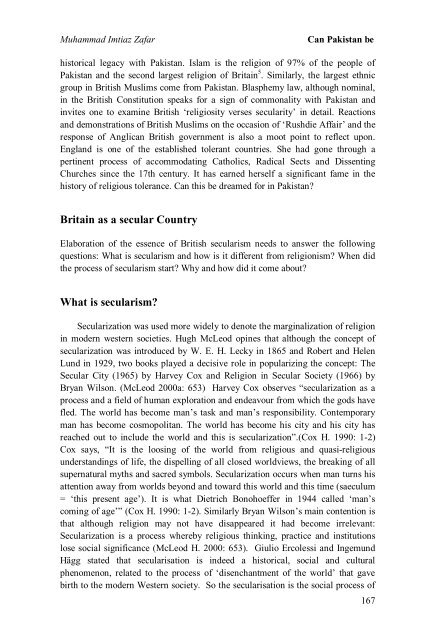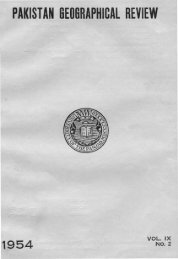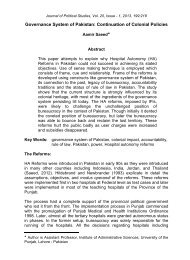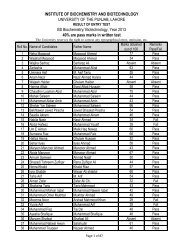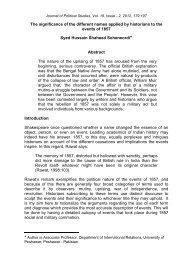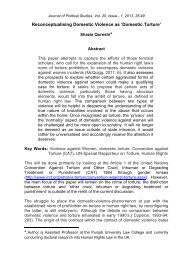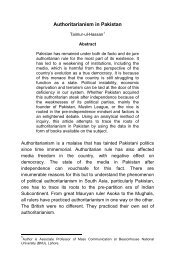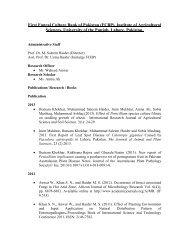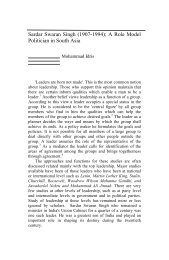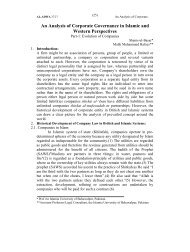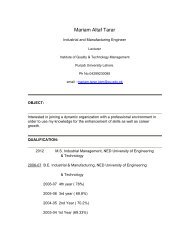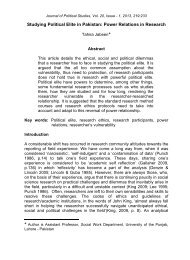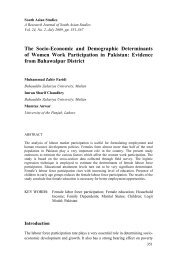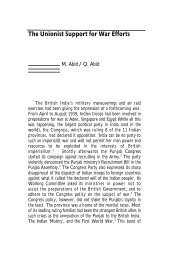Can Pakistan be a Secular State? - University of the Punjab
Can Pakistan be a Secular State? - University of the Punjab
Can Pakistan be a Secular State? - University of the Punjab
Create successful ePaper yourself
Turn your PDF publications into a flip-book with our unique Google optimized e-Paper software.
Muhammad Imtiaz Zafar<br />
<strong>Can</strong> <strong>Pakistan</strong> <strong>be</strong><br />
historical legacy with <strong>Pakistan</strong>. Islam is <strong>the</strong> religion <strong>of</strong> 97% <strong>of</strong> <strong>the</strong> people <strong>of</strong><br />
<strong>Pakistan</strong> and <strong>the</strong> second largest religion <strong>of</strong> Britain 5 . Similarly, <strong>the</strong> largest ethnic<br />
group in British Muslims come from <strong>Pakistan</strong>. Blasphemy law, although nominal,<br />
in <strong>the</strong> British Constitution speaks for a sign <strong>of</strong> commonality with <strong>Pakistan</strong> and<br />
invites one to examine British ‘religiosity verses secularity’ in detail. Reactions<br />
and demonstrations <strong>of</strong> British Muslims on <strong>the</strong> occasion <strong>of</strong> ‘Rushdie Affair’ and <strong>the</strong><br />
response <strong>of</strong> Anglican British government is also a moot point to reflect upon.<br />
England is one <strong>of</strong> <strong>the</strong> established tolerant countries. She had gone through a<br />
pertinent process <strong>of</strong> accommodating Catholics, Radical Sects and Dissenting<br />
Churches since <strong>the</strong> 17th century. It has earned herself a significant fame in <strong>the</strong><br />
history <strong>of</strong> religious tolerance. <strong>Can</strong> this <strong>be</strong> dreamed for in <strong>Pakistan</strong>?<br />
Britain as a secular Country<br />
Elaboration <strong>of</strong> <strong>the</strong> essence <strong>of</strong> British secularism needs to answer <strong>the</strong> following<br />
questions: What is secularism and how is it different from religionism? When did<br />
<strong>the</strong> process <strong>of</strong> secularism start? Why and how did it come about?<br />
What is secularism?<br />
<strong>Secular</strong>ization was used more widely to denote <strong>the</strong> marginalization <strong>of</strong> religion<br />
in modern western societies. Hugh McLeod opines that although <strong>the</strong> concept <strong>of</strong><br />
secularization was introduced by W. E. H. Lecky in 1865 and Ro<strong>be</strong>rt and Helen<br />
Lund in 1929, two books played a decisive role in popularizing <strong>the</strong> concept: The<br />
<strong>Secular</strong> City (1965) by Harvey Cox and Religion in <strong>Secular</strong> Society (1966) by<br />
Bryan Wilson. (McLeod 2000a: 653) Harvey Cox observes “secularization as a<br />
process and a field <strong>of</strong> human exploration and endeavour from which <strong>the</strong> gods have<br />
fled. The world has <strong>be</strong>come man’s task and man’s responsibility. Contemporary<br />
man has <strong>be</strong>come cosmopolitan. The world has <strong>be</strong>come his city and his city has<br />
reached out to include <strong>the</strong> world and this is secularization”.(Cox H. 1990: 1-2)<br />
Cox says, “It is <strong>the</strong> loosing <strong>of</strong> <strong>the</strong> world from religious and quasi-religious<br />
understandings <strong>of</strong> life, <strong>the</strong> dispelling <strong>of</strong> all closed worldviews, <strong>the</strong> breaking <strong>of</strong> all<br />
supernatural myths and sacred symbols. <strong>Secular</strong>ization occurs when man turns his<br />
attention away from worlds <strong>be</strong>yond and toward this world and this time (saeculum<br />
= ‘this present age’). It is what Dietrich Bonohoeffer in 1944 called ‘man’s<br />
coming <strong>of</strong> age’” (Cox H. 1990: 1-2). Similarly Bryan Wilson’s main contention is<br />
that although religion may not have disappeared it had <strong>be</strong>come irrelevant:<br />
<strong>Secular</strong>ization is a process whereby religious thinking, practice and institutions<br />
lose social significance (McLeod H. 2000: 653). Giulio Ercolessi and Ingemund<br />
Hägg stated that secularisation is indeed a historical, social and cultural<br />
phenomenon, related to <strong>the</strong> process <strong>of</strong> ‘disenchantment <strong>of</strong> <strong>the</strong> world’ that gave<br />
birth to <strong>the</strong> modern Western society. So <strong>the</strong> secularisation is <strong>the</strong> social process <strong>of</strong><br />
167


